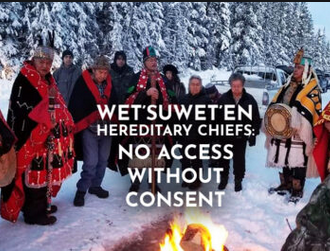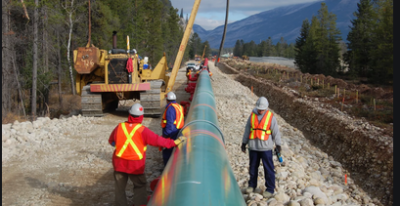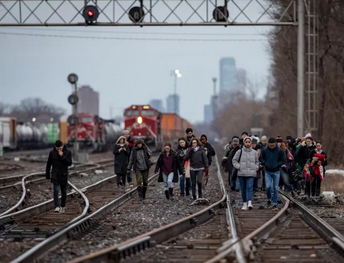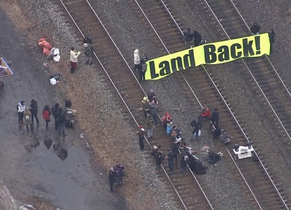February 26th, 2020
BURLINGTON, ON
Justin Trudeau landed about right. After all, he couldn’t have ordered the RCMP to intervene in the non-violent blockades even if he’d wanted. Of course that won’t stop critics from attacking him. The NDP argued he should have met with the hereditary chiefs and further discouraged the police from moving in. And the Conservatives virtually demanded he invoke Canada’s emergency legislation and send in the army.
But after two weeks and with no sign of dialogue in the works, he told Canadians that enough is enough. He was careful to distinguish between the dispute over the gas pipeline, which had ignited this conflict, and the other protestors with other complaints, primarily in Ontario and Quebec.
These other complaints might be about historical aboriginal injustice. Or perhaps it’s just some folks looking for a diversion from reading about the imminent threat of coronavirus, or maybe just a chance to get out of the house and do some good old fashioned civil disobedience.

The idea that Mohawks were defending the rights of the Wet’suwet’en all the way in B.C. is a stretch.
Given the history of indigenous peoples in Canada, the idea that Mohawks were defending the rights of the Wet’suwet’en all the way in B.C. is a stretch. And who were they supporting anyway, since not all the hereditary chiefs are opposed to the construction? In fact, a majority of Wet’suwet’en leaders support and have signed on to the pipeline.
So why were the tracks at Belleville blocked when the prime responsibility to resolve land issues around this pipeline resides with the B.C. government, not the feds and certainly nothing to do with Ontario? And even the RCMP in B.C. operate under contract with the province. So there is little that some guy in Ottawa is going to achieve by sticking his nose in.
Still, it is easy to understand why this Coastal GasLink pipeline is an affront to some of the Wet’suwet’en. The land is ‘unceded’, meaning the title is still undetermined, even though they have lived on it for centuries and consider it theirs. Then another affront came when opposing chiefs suggested another route for the pipe, only to be ignored.
And, of course, first nations are all about natural conservation and this project is all about hazardous fossil fuel development.
The natural gas, methane, in the pipe will be shipped to overseas markets – so one might think there would be little environmental consequence to Canada or B.C. But methane is not the clean fuel that used to be advertised. Methane gas is as much as 70 times more powerful a greenhouse gas than CO2 depending on the time frame. And the production and transport of methane results in leaks, called fugitive emissions of the gas. The federal climate assessment puts fugitive gas emissions just under 10% of Canada’s total emissions.
Of course fugitive emissions, like any self respecting fugitive, tends to be a little hard to pin down, so we’re not sure how high they really are. It is estimated that between 1992 and 2012, fugitive methane emissions accounted for 7% of the world’s greenhouse gases. And it is estimated that the world annually loses $30 billion in fugitive gas emission value.
And the concern about the further development of fossil fuels is likely the reason why so many non-indigenous folks came out to join the protests and blockades. Their children will be thanking them when everyone reduces their carbon footprint. But it is a long way and a lot of burnt carbon to join the real blockade up in Wet’suwet’en country, so they need to protest here.
But protesting railroads everywhere is a really dumb idea. The railroads and even the rail companies have even less to do with the gas pipeline than the Mohawks do with the Wet’suwet’en. And even with those diesel guzzling train engines, rail travel is the most efficient way of moving goods and people. And that means rail travel makes for a smaller footprint than other transportation, excepting a bicycle or electric vehicle. So, for all those protestors who are just there to support their ancestral brothers and sisters and hopefully help kill another fossil fuel project, they need to rethink what they are doing.
It’s not the protesting but how these fine folks are protesting. The pipeline at issue carries only natural gas. But instead of attacking natural gas and the companies behind it, these rail line protests are hurting commuters and tourists and those who rely on rail for goods and services – and that eventually is too many of us.
Canadian acceptance of some kind of new deal with our aboriginal folks has never been more positive and with a compliant federal government more than eager to act. One can only wonder how those attitudes might shift should these blockades continue for any length of time – or this minority government fall.
And if you really want to make your protest meaningful, instead of creating havoc for commuters and others reliant on our rail systems, why not make the punishment fit the crime. Protest the use of natural gas. Call your gas company today and cancel your gas contract. Buy an electric heater to get you through the season until you can replace your furnace with a 90% carbon free heat pump.
And if you really want to be heard, sign onto your favourite social media and ask all your friends and family to also eliminate their gas bills and get rid of gas. And seriously, isn’t it better to be sitting at your iPad in the comfort of your home tweeting, or whatever, rather than freezing in the cold Ontario winter in the midst of shivering crowds and in the season of coronavirus?
 Ray Rivers writes regularly on both federal and provincial politics, applying his more than 25 years as a federal bureaucrat to his thinking. Rivers was once a candidate for provincial office in Burlington. He was the founder of the Burlington citizen committee on sustainability at a time when climate warming was a hotly debated subject. Ray has a post graduate degree in economics that he earned at the University of Ottawa. Tweet @rayzrivers
Ray Rivers writes regularly on both federal and provincial politics, applying his more than 25 years as a federal bureaucrat to his thinking. Rivers was once a candidate for provincial office in Burlington. He was the founder of the Burlington citizen committee on sustainability at a time when climate warming was a hotly debated subject. Ray has a post graduate degree in economics that he earned at the University of Ottawa. Tweet @rayzrivers
Background links:
Protests – Gas Emissions – Train Protests –
Reconciliation is Dead – Emissions –
























Hans – thank you for your comment – I always appreciate your contribution. One of the links at the end of the column will take you to a federal site which discusses methane as well as emissions generally. I came across this US site which is also quite informative…
https://www.sightline.org/2019/02/12/methane-climate-change-co2-on-steroids/
You are correct that it is a complicated matter and as Jim rightly points out, the fugitive emissions from oil and gas production/distribution is just one source of methane released into the atmosphere, but still a significant source.
I agree with Fred – they relevant protesters should be sued. On Stephen’s comments, I agree as well and something like the energy corridor that was briefly discussed in the last election is a great strategic idea and it is not just for pipeline(s), we need it more for electrical transmission and distribution lines to enable ‘green’ generation to get the power to the users. We have some vast hydro capabilities that can be tapped in this regard. Provincial boundaries on this have created (some) issues in allowing the freer flow of electricity to needed areas.
Ray,
A few of your points require further clarification, IMO:
Re: “Methane gas is as much as 70 times more powerful a greenhouse gas than CO2 depending on the time frame.” – that may be the case if it’s emitted into the atmosphere, but not if it is burned. In the latter case it is merely converted to CO2 and water.
Re: “Buy an electric heater to get you through the season until you can replace your furnace with a 90% carbon free heat pump.” – Heat pumps are similar to air conditioners and are typically powered by electricity. Unless that electricity is generated without hydrocarbon combustion (e.g., hydraulic, wind, solar, etc.) it would probably not be “90% carbon free” at the power plant. In addition, there is significant “line loss” in electricity transmission, making it less efficient than it may seem at first glance.
The two main producers of methane are natural decomposition on the forest floor and the production of meat on farms. There is not much we can do about the first and I hope Ray is not suggesting we get out of the meat producing business in Canada.
Of more importance we should not be negotiating with extortionists that are using terrorist tactics to advance their position. Bill Blair, says correctly that the politicians should not impose tactics on the police but they have every right to set the timeline and then its up to the police to assemble the recourses to get get it done by then. In the meantime since government revenues are falling due to the transportation interruption, governments at all levels should stop sending money to natives and native organizations until the unlawful protests stop.
Somebody should tell the protesters that their actions are creating thousands of new racists against the indigenous people on a daily basis and make reconciliation much more difficult in the future. Maybe they do not care. I hope not.
Ray, as usual, your column is thoughtful and balanced. This is a complex issue with roots that go back many many years and neither political party in power has been able to resolve these complex issues. It is worth remembering that the indigenous population in this country is growing at a rapid rate, and these festering issues will continue to cause us all grief.
I’m very glad to see a column that not only examines the problem from all sides but also provides solutions within the grasp of the average reader. This kind of journalism is becoming increasingly rare.
Shout, dance and wave your signs all you want in front of the legislature. Picket your MPPS or MPs office, but blocking a private business from conducting their work on their land, is unlawful. As such, CN/CP and any business who experienced out of pocket costs should be able to sue those folks arrested for breaking the law. In addition, the taxpayers of Ontario should also be allowed to sue those folks for the out of pocket costs they incurred for additional GO Bus drivers etc. If you want to break the law, you need to be prepared to pay the cost. Once these folks realize their own money is at risk for their actions, the rail protests would stop.
Yes Ray…closing down railway lines, disrupting rail shipments, creating havoc in the transportation system, and inconveniencing thousands of rail commuters isn’t very productive. Having a Prime Minister who spouts self-righteous, saccharine laced homilies about “consultation” and “dialogue”, and then retreats behind closed doors to confer with advisors, and is now MIA, isn’t helpful either. And having Indigenous demonstrators who, despite the fact that the majority of tribal elders and Band Councils had previously approved the Coastal Gas Link project recognizing the jobs and financial benefits it will bring, and then hold the country hostage as part of their protest, isn’t particularly helpful to their cause.
The Indigenous file, the environmental file, the natural resources file, and Western Canadian alienation, are now inextricably intertwined and conflated. The government has no clue how to proceed, but frankly, neither do the Opposition. What is clearly needed is a natural strategy on how to move forward. Not more Climate Change conferences, but rather, practical measures, incentives and ideas on how the country and its citizens can move forward to meaningfully address global warming while simultaneously creating economic opportunities and moving towards energy self-sufficiency.
One thing is becoming abundantly clear though. We have a Prime Minister who is woefully inadequate and ill-equipped to lead the country, and whose charm offensives and appeals to goodwill are increasingly falling on deaf ears.